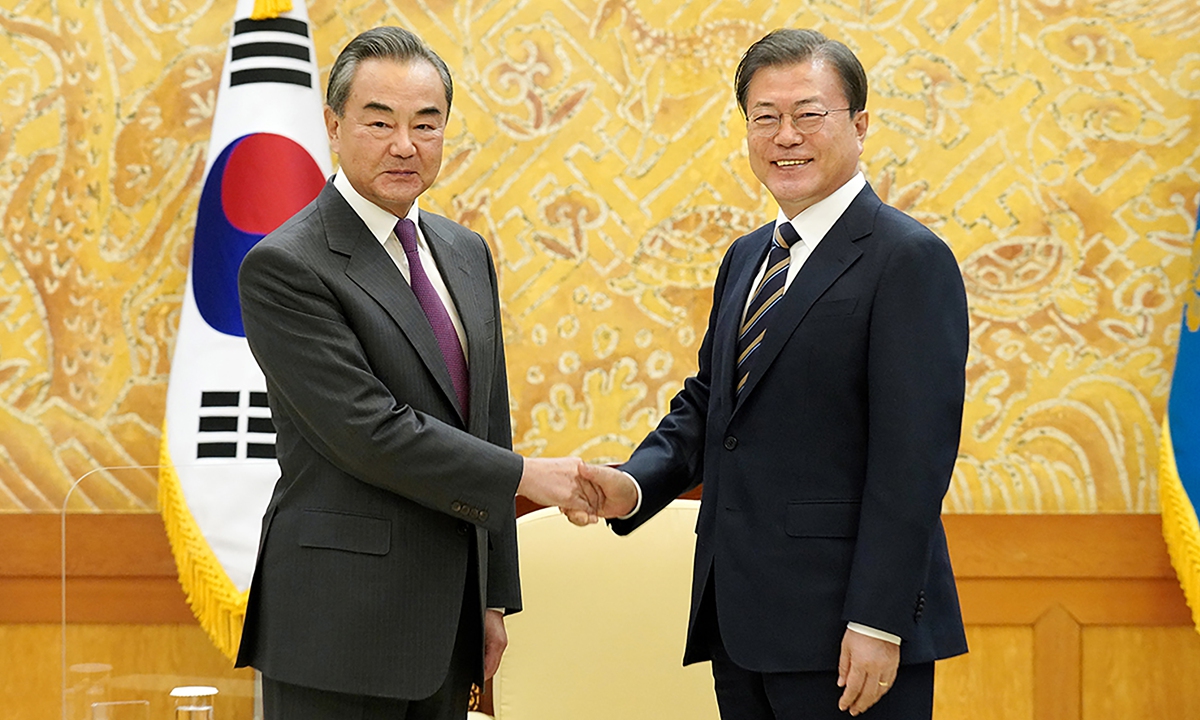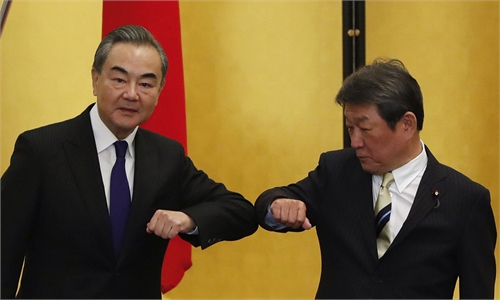FM's S.Korea trip spells deeper ties amid pandemic, shows resilience against outside pressure
FM's tour shows regional cohesion, resilience from outside

Chinese State Councilor and Foreign Minister Wang Yi (left) shakes hands with South Korean President Moon Jae-in during their meeting at the presidential house in Seoul on Thursday. Photo: AFP
Chinese State Councilor and Foreign Minister Wang Yi's ongoing three-day visit to South Korea has yielded substantial fruits, reaching a ten-point consensus on issues ranging from anti-pandemic cooperation and advancing the Free Trade Agreement (FTA), to cultural exchanges and establishing a committee to chart a blueprint for future bilateral ties, which experts said showed deepening ties between the two countries and hinted at better cooperation despite US pressure.
Wang arrived in South Korea in late Wednesday after he wrapped up the two-day trip to Japan. Wang's tour to Japan and South Korea showed that by putting aside disputes, the three major countries in Asia could work together to promote regional economic development amid the coronavirus pandemic, and be resilient to uncertainties from outside the region, analysts said.
During the meeting between Wang and South Korean Foreign Minister Kang Kyung-wha on Thursday, they reached a 10-point consensus, which focused on facilitating free trade talks between China and South Korea and the implementation of the world's largest free trade agreement - Regional Comprehensive Economic Partnership (RCEP), which China, South Korea and Japan signed.
Lü Chao, director of Center for Korean studies at Liaoning Academy of Social Sciences, told the Global Times that the consensus reached with Seoul reflects Beijing's willingness to further develop the China-South Korea strategic cooperative partnership and to promote economic cooperation in Northeast Asia after the RCEP signing.
Lü said that there is much overlap between the South Korea's "New Northern Policy" and Belt and Road Initiative. China, Japan and South Korea are the "economic locomotive" of Northeast Asia and even Asia, and their cooperation will boost regional economy amid the pandemic.
Hwang Jaeho, a professor at Hankuk University of Foreign Studies in Seoul, told the Global Times that China's promotion of the signing of the RCEP, its openness to join the Comprehensive and Progressive Agreement for the Trans-Pacific Partnership (CPTPP), and its work on facilitating talks on the China-Japan-South Korea Free Trade Agreement (FTA) showed that China is fulfilling its promise of multilateralism and globalization, which also stimulates China-South Korea cooperation.
The expert noted that South Korean President Moon Jae-in's recent policies in boosting the economy, which needs to expand trade exchanges with other countries, could work better with China's "dual circulation" plan on connectivity with the outside world.
Topics concerning RCEP and the trilateral FTA ran through Wang's ongoing tour. The achievements showed that it is promising for the three major countries in Asia to work together on regional development and stability through high-level talks.
But Japan also has political concerns that may sometimes hinder trilateral cooperation. Lü noted that due to US political influence on Tokyo, while Seoul applies a relatively independent foreign policy, the room for future cooperation between China and South Korea will be greater than that between China and Japan.
Negotiations on the China-South Korea-Japan FTA have been going on since 2012. Observers believe that the signing of RCEP before Wang's visit provided a new opportunity for the completion of the three-country FTA. And the China-Japan cooperation agreement made during Wang's visit to Japan earlier this week will add momentum to China-South Korea talks, and regional cooperation would benefit everyone.
Aside from reaching agreements on economic cooperation during the meeting, China and South Korea also agreed to follow the guidance of the two countries' leaders, enhance friendship and mutual trust, deepen pragmatic cooperation and push the China-South Korea strategic cooperative partnership to a new level.
The two sides agreed to set up the commission on the future development of China-South Korea relations to draw up a blueprint for the development of bilateral relations over the next 30 years as the year of 2022 marks the 30th anniversary of the establishment of diplomatic ties between China and South Korea.
Hwang said that people in South Korea are impressed by Wang's trip, which happened during the COVID-19 pandemic. He noted that former prime minister Lee Nak-Yeon who was scheduled to meet with Wang, but had to cancel it due to his quarantine, sent a flower basket and a poem to Wang after his arrival.
"Lee cited a phrase from Confucius classics to applaud Wang's visit to South Korea, and extended hopes for a better China-South Korea ties," Hwang said, noting that the two countries will work more to deepen mutual trust and ties.



